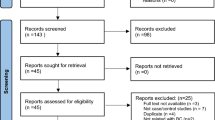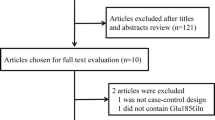Abstract
Published data regarding the association between XPG Asp1104His polymorphism and bladder cancer risk remained controversial. This meta-analysis of literatures was performed to draw a more precise estimation of the relationship. We systematically searched PubMed, Embase, and Web of Science with a time limit of June 22, 2013. Summary odds ratios (ORs) with 95 % CIs were used to assess the strength of the association between XPG Asp1104His polymorphism and bladder cancer risk using random effects model. A total of eight case–control studies including 2,613 cases and 2,934 controls were included for analysis. Overall, no significant association was found between XPG Asp1104His polymorphism and bladder cancer susceptibility for CC vs. GG (OR = 1.12, 95 % CI = 0.74–1.69), GC vs. GG (OR = 1.12, 95 % CI = 0.86–1.46), the dominant model CC + GC vs. GG (OR = 1.08, 95 % CI = 0.85–1.38), and the recessive model CC vs. GC + GG (OR = 0.92, 95 % CI = 0.66–1.29). In the subgroup analysis, no significant associations were found in either Asian or non-Asian population. This meta-analysis suggested that XPG Asp1104His polymorphism was not associated with bladder cancer risk.



Similar content being viewed by others
References
Jemal A, Bray F, Melissa M, Ferlay J, Ward E. Global cancer statistics. CA Cancer J Clin. 2011;61:69–90.
Bertuccio P, Chatenoud L, Levi F, Praud D, Ferlay J, Negri E, et al. Recent patterns in gastric cancer: a global overview. Int J Cancer. 2009;125:666–73.
Hayes JD, Flanagan JU, Jowsey IR. Glutathione transferases. Annu Rev Pharmacol Toxicol. 2005;45:51–88.
Naccarati A, Pardini B, Hemminki K, Vodicka P. Sporadic colorectal cancer and individual susceptibility: a review of the association studies investigating the role of DNA repair genetic polymorphisms. Mutat Res. 2007;635:118–45.
Tse D, Zhai R, Zhou W, Heist RS, Asomaning K, Su L, et al. Polymorphisms of the NER pathway genes, ERCC1 and XPD are associated with esophageal adenocarcinoma risk. Cancer Causes Control. 2008;19:1077–83.
Araujo SJ, Nigg EA, Wood RD. Strong functional interactions of TFIIH with XPC and XPG in human DNA nucleotide excision repair, without a preassembled repairosome. Mol Cell Biol. 2001;21:2281–91.
Scherly D, Nouspikel T, Corlet J, Ucla C, Bairoch A, Clarkson SG. Complementation of the DNA repair defect in xeroderma pigmentosum group G cells by a human cDNA related to yeast RAD2. Nature. 1993;363:182–5.
Emmert S, Schneider TD, Khan SG, Kraemer KH. The human XPG gene: gene architecture, alternative splicing and single nucleotide polymorphisms. Nucleic Acids Res. 2001;29:1443–52.
Stephens JC, Schneider JA, Tanguay DA, Choi J, Acharya T, Stanley SE, et al. Haplotype variation and linkage disequilibrium in 313 human genes. Science. 2001;293:489–93.
Juson R, Stenphen JC, Windemuth A. The predictive power of haplotypes in clinical response. Pharmacogenomics. 2000;1:15–6.
Fallin D, Cohen A, Essioux L, Chumakov I, Blumenfeld M, Cohen D, et al. Genetic analysis of case/control data using estimated haplotype frequencies: application to APOE locus variation and Alzheimer’s disease. Genome Res. 2001;11:143–51.
Stang A. Critical evaluation of the Newcastle-Ottawa scale for the assessment of the quality of nonrandomized studies in meta-analyses. Eur J Epidemiol. 2010;25:603–5.
DerSimonian R, Laird N. Meta-analysis in clinical trials. Control Clin Trials. 1986;7:177–88.
Ades AE, Lu G, Higgins JP. The interpretation of random-effects meta-analysis in decision models. Med Decis Making. 2005;25:646–54.
Mantel N, Haenszel W. Statistical aspects of the analysis of data from retrospective studies of disease. J Natl Cancer Inst. 1959;22:719–48.
Laird NM, Ware JH. Random-effects models for longitudinal data. Biometrics. 1982;38:963–74.
Cochran WG. The combination of estimates from different experiments. Biometrics. 1954;10:101–29.
Higgins JP, Thompson SG. Quantifying heterogeneity in a meta-analysis. Stat Med. 2002;21:1539–58.
Ioannidis JP, Boffetta P, Little J, O’Brien TR, Uitterlinden AG, Vineis P, et al. Assessment of cumulative evidence on genetic associations: interim guidelines. Int J Epidemiol. 2008;37:120–32.
Begg CB, Mazumdar M. Operating characteristics of a rank correlation test for publication bias. Biometrics. 1994;50:1088–101.
Egger M, Davey Smith G, Schneider M, Minder C. Bias in meta-analysis detected by a simple, graphical test. BMJ. 1997;315:629–34.
Wen H, Feng CC, Fang ZJ, Xia GW, Jiang HW, Xu G, et al. Study on bladder cancer susceptibility and genetic polymorphisms of XPC, XPG, and CYP in smokers and non-smokers. Actas Urol Esp. 2012;37(5):259–65.
Rouissi K, Ouerhani S, Hamrita B, Bougatef K, Marrakchi R, Cherif M, et al. Smoking and polymorphisms in xenobiotic metabolism and DNA repair genes are additive risk factors affecting bladder cancer in Northern Tunisia. Pathol Oncol Res. 2011;17:879–86.
Rouissi K, Bahria IB, Bougatef K, Marrakchi R, Stambouli N, Hamdi K, et al. The effect of tobacco, XPC, ERCC2 and ERCC5 genetic variants in bladder cancer development. BMC Cancer. 2011;11:101.
Narter KF, Ergen A, Agaçhan B, Görmüs U, Timirci O, Isbir T. Bladder cancer and polymorphisms of DNA repair genes (XRCC1, XRCC3, XPD, XPG, APE1, hOGG1). Anticancer Res. 2009;29:1389–93.
Wen H, Ding Q, Fang ZJ, Xia GW, Fang J. Population study of genetic polymorphisms and superficial bladder cancer risk in Han-Chinese smokers in Shanghai. Int Urol Nephrol. 2009;41:855–64.
García-Closas M, Malats N, Real FX, Welch R, Kogevinas M, Chatterjee N, et al. Genetic variation in the nucleotide excision repair pathway and bladder cancer risk. Cancer Epidemiol Biomarkers Prev. 2006;15:536–42.
Wu X, Gu J, Grossman HB, Amos CI, Etzel C, Huang M, et al. Bladder cancer predisposition: a multigenic approach to DNA-repair and cell-cycle-control genes. Am J Hum Genet. 2006;78:464–79.
Sanyal S, Festa F, Sakano S, Zhang Z, Steineck G, Norming U, et al. Polymorphisms in DNA repair and metabolic genes in bladder cancer. Carcinogenesis. 2004;25:729–34.
Minelli C, Thompson JR, Abrams KR, Thakkinstian A, Attia J. How should we use information about HWE in the meta-analyses of genetic association studies? Int J Epidemiol. 2008;37:136–46.
Hirschhorn JN, Lohmueller K, Byrne E. A comprehensive review of genetic association studies. Genet Med. 2002;4:45–61.
Ding D-P, He X-F, Zhang Y. Lack of association between XPG Asp1104His and XPF Arg415Gln polymorphism and breast cancer risk: a meta-analysis of case–control studies. Breast Cancer Res Treat. 2011;129:203–9.
Fagbemi AF, Orelli B, Scharer OD. Regulation of endonuclease activity in human nucleotide excision repair. DNA Repair. 2011;10:722–9.
Cheng L, Sturgis EM, Eicher SA, Spitz MR, Wei Q. Expression of nucleotide excision repair genes and the risk for squamous cell carcinoma of the head and neck. Cancer. 2002;94:393–7.
Cheng L, Spitz MR, Hong WK, Wei Q. Reduced expression levels of nucleotide excision repair genes in lung cancer: a case–control analysis. Carcinogenesis. 2000;21:1527–30.
Yang Z, Nie S, Zhu H, Wu X, Jia S, Luo Y, et al. Association of p53 Arg72Pro polymorphism with bladder cancer: a meta-analysis. Gene. 2013;512:408–13.
Han SX, Wang L, Wu DQ. The association between UGT1A7 polymorphism and cancer risk: a meta-analysis. Cancer Epidemiol. 2012;36:e20120–6.
Li F, Li C, Jiang Z, Ma N, Gao X. XRCC3 T241M polymorphism and bladder cancer risk: a meta-analysis. Urology. 2011;77:511.e1-5.
Acknowledgments
This study was supported by the Natural Science Foundation of The People’s Republic of China (no. 81072175 and no.81202096). The funders had no role in the study design, data collection and analysis, decision to publish, or preparation of the manuscript.
Conflicts of interest
None
Author information
Authors and Affiliations
Corresponding author
Additional information
Chuan Liu and Qinghua Yin contributed equally to the study.
Rights and permissions
About this article
Cite this article
Liu, C., Yin, Q., Hu, J. et al. Quantitative assessment of the association between XPG Asp1104His polymorphism and bladder cancer risk. Tumor Biol. 35, 1203–1209 (2014). https://doi.org/10.1007/s13277-013-1161-9
Received:
Accepted:
Published:
Issue Date:
DOI: https://doi.org/10.1007/s13277-013-1161-9




